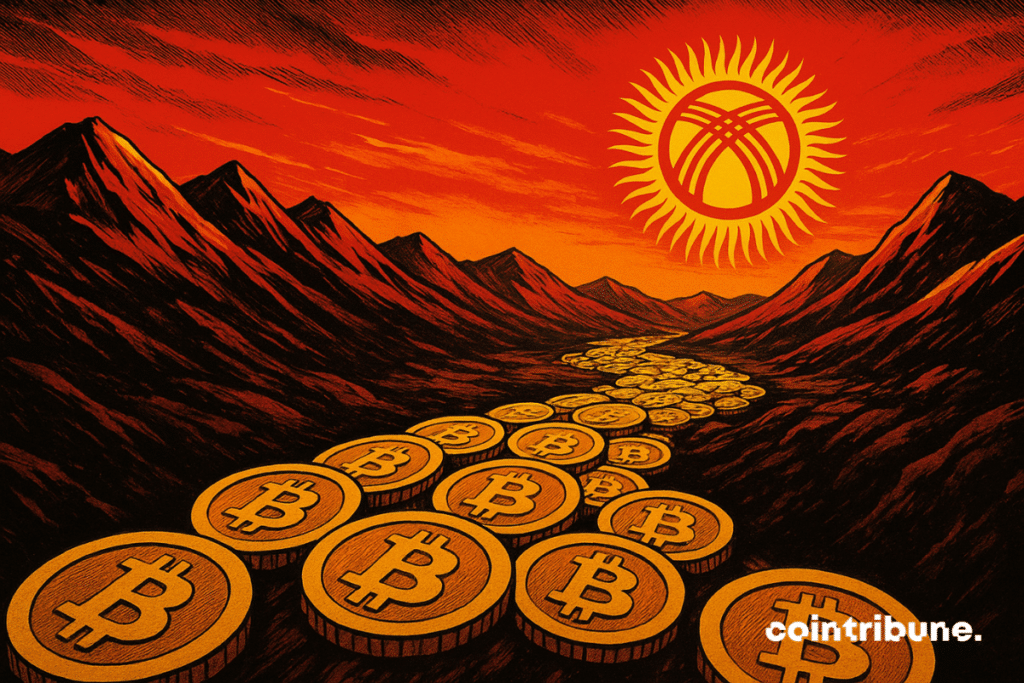Why Central Asian Nations Are Turning to Bitcoin
More and more businesses are accumulating bitcoins, but also more and more countries. The latest comes from Central Asia.

In brief
- The Kyrgyz Parliament approves the creation of a strategic bitcoin reserve.
- A public entity will be responsible for mining bitcoins using surplus hydroelectric energy.
- Explosion of turnover of Kyrgyz cryptocurrency platforms in 2025.
Bitcoin at the Heart of Asia
After Kazakhstan, it is now the turn of its Kyrgyz neighbor to announce the creation of a strategic bitcoin reserve.
The country has experienced a massive increase in volumes over its 13 cryptocurrency platforms in the past two years. The reason being that Russia uses them to circumvent sanctions… Accordingly, some platforms were sanctioned by the United States and the United Kingdom a few weeks ago.
These sanctions add to those imposed on banks earlier this year. They pushed Prime Minister Sadyr Zhaparov to ask President Trump and the British Prime Minister to “not politicize the economy”.
An economy doing well since the turnover of cryptocurrency platforms has exceeded 11 billion dollars in the first seven months of the year. That’s 200 times more than in 2022…
The Minister of Economy and Trade, Bakyt Sydykov, revealed this Tuesday in a parliamentary meeting that the law “on virtual assets” will soon be amended. The goal is notably to regulate the creation of a public entity responsible for mining bitcoins.
The potential is huge since the World Bank estimates that only 10% of the country’s hydroelectric potential is being exploited. Enough to create a “national bitcoin reserve” according to the minister.
Kyrgyzstan Ahead of France
Some Kyrgyz parliamentarians were nevertheless concerned that the deployment of a large industry could cause problems. Deputy Dastan Bekeshev noted that “mining a single bitcoin requires approximately 800,000 kilowatt-hours. That is enough energy to power 1,200 apartments for a month. Winter is approaching, is it worth taking this risk?”
The minister reassured by specifying that the bitcoin industry would not be powered by the country’s large hydroelectric plants. He explained that the production would mainly come from small installations, with 15 new projects under construction to be added to 17 already operational.
One can only lament the absence of such discussions in France. And this, despite intense lobbying for years, notably by the French miner BigBlock.
The electrical grid balance by demand is essential to accommodate at lower cost the puzzle presented by intermittent energies. EDF should mine bitcoins rather than damage nuclear power plants to adapt to the intermittency of wind power.
Bitcoin miners in fact have this very practical advantage of offering a real-time load shedding solution to network operators. This symbiosis between bitcoin miners and energy providers already exists in Texas and there is no reason why we can’t do the same in Europe.
Bitcoin, the New International Reserve Currency
Other countries in the region are closely interested in bitcoin. This is the case for Russia and, very recently, neighboring Kazakhstan. President Tokayev has just approved the creation of a strategic bitcoin reserve.
On Monday, Tokayev’s press service indicated that the President of Kazakhstan wants to create a state fund dedicated to digital assets to establish a strategic reserve of cryptocurrencies, composed of the most promising assets of the new digital financial system.
It seems that the United States is about to act. No country wants to be left behind by the movement. From Taiwan to Japan and South Korea, Asia is preparing.
The United States already controls 35% of the global Bitcoin industry, compared to approximately 17% for Russia and 15% for China. Even the American president’s sons are getting involved. Eric and Donald Trump Jr. have just launched the miner American Bitcoin on the stock market.
In short, everyone expects Washington to make bitcoin its reserve currency. Except in Europe, where it is imagined that the euro could replace the dollar as the ultimate international reserve currency…
The signals are green. Bitcoin ETFs continue to grow, as does the number of companies making bitcoin their main treasury asset. On-chain data also shows that big players are still in accumulation phase, which is a good sign.
The ball is in the court of Senator Cynthia Lummis and her “Bitcoin Act” bill aiming to accumulate one million bitcoins.
While waiting for this long-awaited outcome, don’t miss this article: Bitcoin: The Institutional Rush is in Full Swing.
Maximize your Cointribune experience with our "Read to Earn" program! For every article you read, earn points and access exclusive rewards. Sign up now and start earning benefits.
Bitcoin, geopolitical, economic and energy journalist.
The views, thoughts, and opinions expressed in this article belong solely to the author, and should not be taken as investment advice. Do your own research before taking any investment decisions.